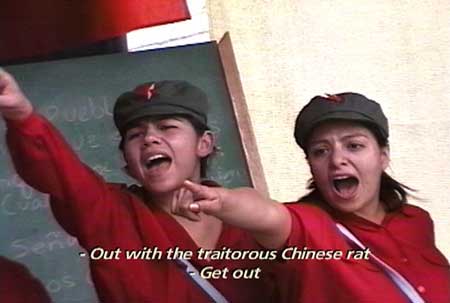
Now in its second year, the spectacularly-funded new-kid-on-the-block Rome Film Fest (Oct. 18-27) exhibits the apparently ontologically inescapable teething pains that all toddlers must endure – disorganization, poor communication skills, a certain clumsiness, and a forward-looking sense of “anything’s possible.” Also, a tendency to imitate the mother’s facial expressions – in this case, the Venice Film Festival in particular and every other “big” film festival in general. What this often leads to is the empty husk of spectacle, or spectacle disassociated from its original purpose and adrift in the free-floating play of eternally recombinant signifiers that is contemporary culture.
Add to this a way-out-of-the-way location that typically took over an hour of travel time to get to, a state of the art audio-visual complex that was weirdly non-functional – for instance, seats in the balcony facing not towards the screen but at a 90 degree angle – and films that were supposed to be subtitled in English but weren’t, and voilà – the Rome Film Festival! But there were stars aplenty: Robert Redford! Tom Cruise! Sean Penn! Emile Hirsch! Sophia Loren! Bernardo Bertolucci! Gerard Depardieu! Jane Fonda! Martin Scorsese! Scratch that, Scorcese couldn’t make it. Ang Lee!
The festival’s most trumpeted achievement was the premiere Francis Ford Coppola’s
Youth Without Youth, his first film in ten years and his self-proclaimed return to his indie roots. Also included was a new documentary on Coppola titled
Coda: Thirty Years After by his wife, Eleanor Coppola (
Hearts of Darkness), followed by an on-stage interview with the man himself. And indeed, the presence of Coppola and his family seems the perfect objective correlative for what this festival was all about – star power, a rather dated notion of cinema, and a fuzzy-minded stab at Italian-ness.
A more courageous curatorial foray was the largest retrospective ever of the always brilliant but occasionally slapdash films of the astonishingly prolific Chilean Director Raul Ruiz, a filmmaker whose work is so original and challenging that a different approach was needed. It’s not enough just to quietly screen 40 Ruiz films in a festival of this size and scope. There needed to be discussions, lectures, special guests, and an on-stage interview. Instead, the Ruiz retrospective was relegated to the margins of the festival, with Ruiz receiving a lifetime achievement award at an award “ceremony” the time of which was never announced. Such oversights made the retrospective seem like someone’s half-hearted attempt to add another notch to their festival belt rather than a sincere and passionate expression of admiration for Ruiz’s prodigious opus.
The most memorable event of the festival, for me, was the in-person conversation with Terrence Malick. Malick, who is legendary for never appearing in public or granting interviews, made a rare and, as far as I know, unprecedented public appearance, with the stipulation that there would be no cameras and that he would only talk about his love of Italian cinema. Like most Malick-worshipping cinephiles, I attended the event with impossibly high expectations. But Malick did not disappoint. He was disarmingly gentle, shy, soft-spoken, humble, and sincere all at once. It struck me as remarkable that someone so obviously pure of heart and other-worldly could exist and function in the gaudy, tinsel-strewn, cut-throat world that is contemporary cinema.
Labels: Festivals
# posted by Jason Guerrasio @ 11/28/2007 03:42:00 PM

Now in its 20th year under the firm stewardship of festival director and art-film connoisseur Alan Franey, the Vancouver International Film Festival (September 27 to October 12) remains the same as it ever was: committed to an intelligent mix of new movies from Asia and Canada (and new nonfiction from around the world), and admirably resistant to the market pressures that sometimes threaten to make its East Coast Canadian sibling, the Toronto International Film Festival, look like one big studio junket. Hardly a haven for awards strategists and sales agents, Vancouver is chiefly for filmmakers and viewers — a fact reiterated at almost every post screening discussion here, but particularly this year at the now legendary Q&A that followed the aptly named
Operation Filmmaker.
If you haven't heard by now, documentarian Nina Davenport's politicization of the
Project Greenlight formula — here the vaguely talented young hopeful hails from war-torn Baghdad — is a total knockout. But the blows delivered after one of three VIFF screenings are what accounts for the persistent buzz.
Among those who defended Davenport against audience accusations that she had exploited and otherwise unduly dissed twentysomething Iraqi playa Muthana Mohmed — a PA on lefty Liev Schreiber's
Everything is Illuminated set — is the
Boston Phoenix's Gerald Peary. After several viewer indictments of Davenport, who's seen in the film giving money and other support to the reluctantly self-sufficient Mohmed, Peary stood up and said, "Don't you people understand that this film is a
comedy? In Toronto, people were rolling in the aisles! You're all so serious!"
Neither was knee-jerk political correctness on the agenda of another Davenport fan, Jim Finn, whose own VIFF film
La Trinchera Luminosa del Presidente Gonzalo (
The Shining Trench of Chairman Gonzalo) [pictured above] — something of a Hi-8
La Chinoise — is a thoroughly fascinating, scrupulously provocative mock-doc about young female members of the Shining Path, the Peruvian Maoist revolutionary terrorist group, circa 1989.
"I'm an independent filmmaker," Finn announced when the Q&A for
Operation was threatening to get bloody. "And I can tell you," he joked, "that we're all assholes, pretty much."
Speaking more seriously a few days later, Finn gave props to the VIFF for its programmers' enthusiastic support of indie filmmakers with something to say and limited means with which to do it. "You get here [to Vancouver]," Finn says, "and right away you can tell that the festival people have not only seen your film, but they know it well and they understand it. They really want you to be at the festival. And in my experience, that's pretty rare."
Like his staff members, including
Cinema Scope editor-in-chief Mark Peranson, Franey is an unmistakably devoted cineaste. He still vividly remembers attending the original incarnation of the VIFF with his dad in the early '60s, when the great Michelangelo Antonioni came to town and critic Pauline Kael served on a jury. This year, Franey's fest drew a record 150,000 people and plenty of positive feedback, which encourages him to continue focusing on the fest's mission to serve not only artistically significant work, but that which, like Finn's film, could use a leg up.
"As much as we like seeing
Pirates 3 and
Shrek 3, et cetera," says Franey, "the truth is that for anyone who cares about cinema, the diversity of voices and the excellence of other forms of cinema is incredibly threatened. So that's why we stick to our guns. We're a nonprofit cultural institution. We don't think we should be paying Canadian taxpayers' money on promoting the latest Hollywood release."
The closest this year's edition came to routine stargazing was the ritzy French farce
Priceless, with
Amelie's Audrey Tautou as a Cote d'Azur golddigger whose latest "catch" turns out to tend bar. Screened on closing night, the movie served to prep the well-dressed crowd for an aptly swank afterparty at the Sheraton Wall Center. Maybe it even warned a few wealthy spouses with roving eyes not to mistake one of the Sheraton's expert cocktail-mixers for the next Mr. Moneybags.
But for this decidedly non-bourgie reviewer,
Priceless wasn't worth a Canadian nickel past the first half-hour; indeed, the sight of Tautou and Gad Elmaleh's hardly suave martini man squirming in bed sent the sleepy critic straight back to the hotel, where clean sheets and a DVD of the VIFF's, um,
Young People Fucking awaited.
Likewise more valuable than
Priceless was the $25,000 cash-prize award — announced before the screening — to
The Planet, one of nearly a dozen films in the fest's "Climate for Change" series, sponsored by the pro-Earth activists at Kyoto Planet. Not a Nobel Prize, perhaps, but a little green won't hurt
The Planet — nor its three heretofore unknown Swedish directors (Michael Stenberg, Johan Soderberg, and Linus Torell).
Unlike Earth, the "ecosystem" that Franey mentions — that of Canadian festivals — isn't endangered in the least. "What we share [with the TIFF] is English Canada, and that's a small market about half the size of California," Franey says. "And yet we have two festivals less than two weeks apart. It works, because it's actually not a competitive relationship between the two [festivals]. As a matter of fact, Toronto — which does well at maintaining that very public, business, glamorous face — helps save us a bit of those commercial pressures. We've always operated as a complimentary opposite [to Toronto], and I see no reason to change that."
Labels: Festivals
# posted by Jason Guerrasio @ 11/06/2007 10:28:00 AM

